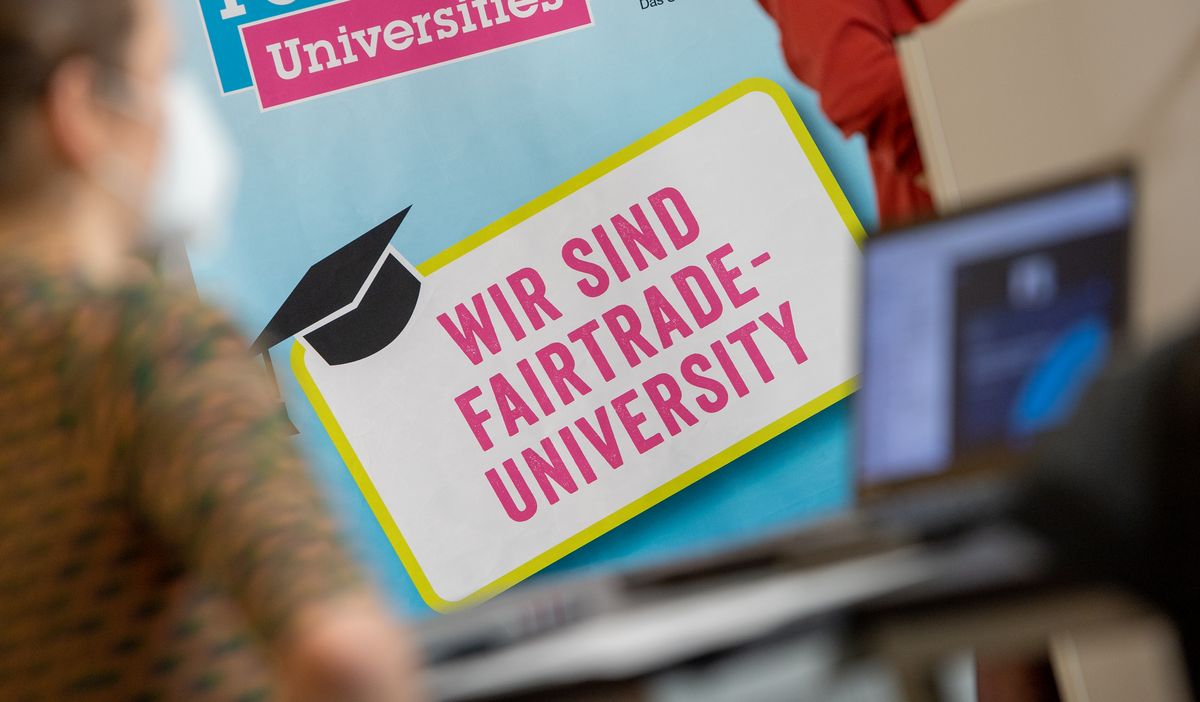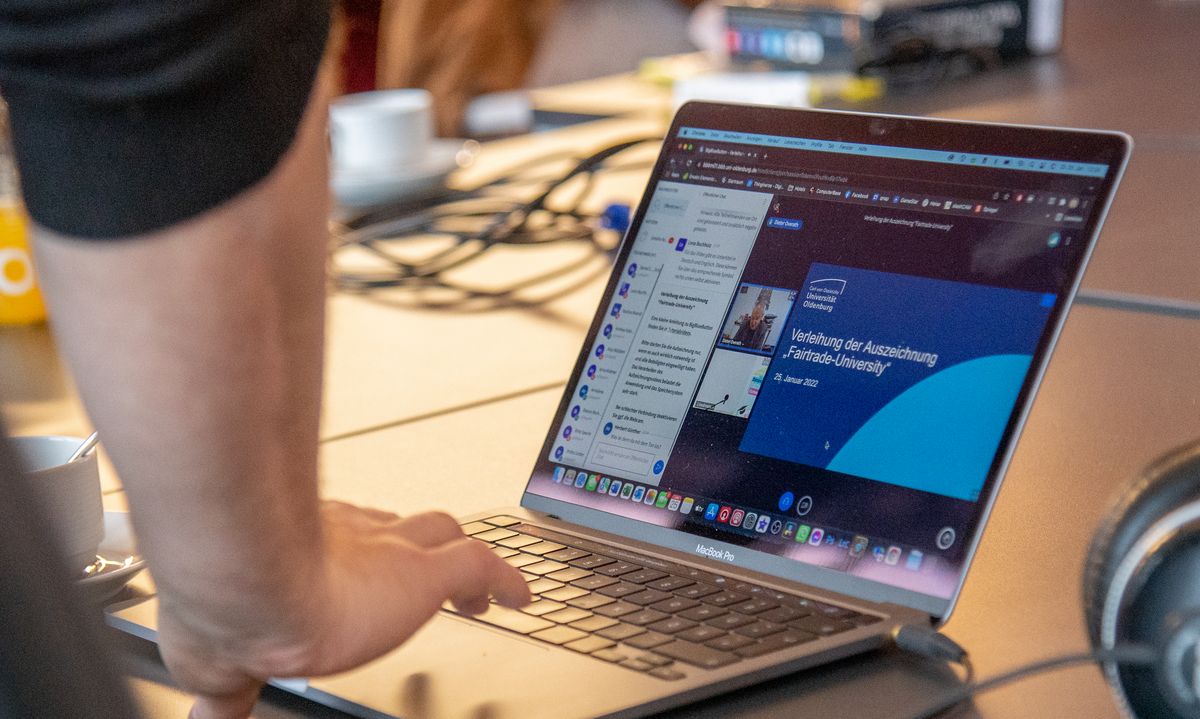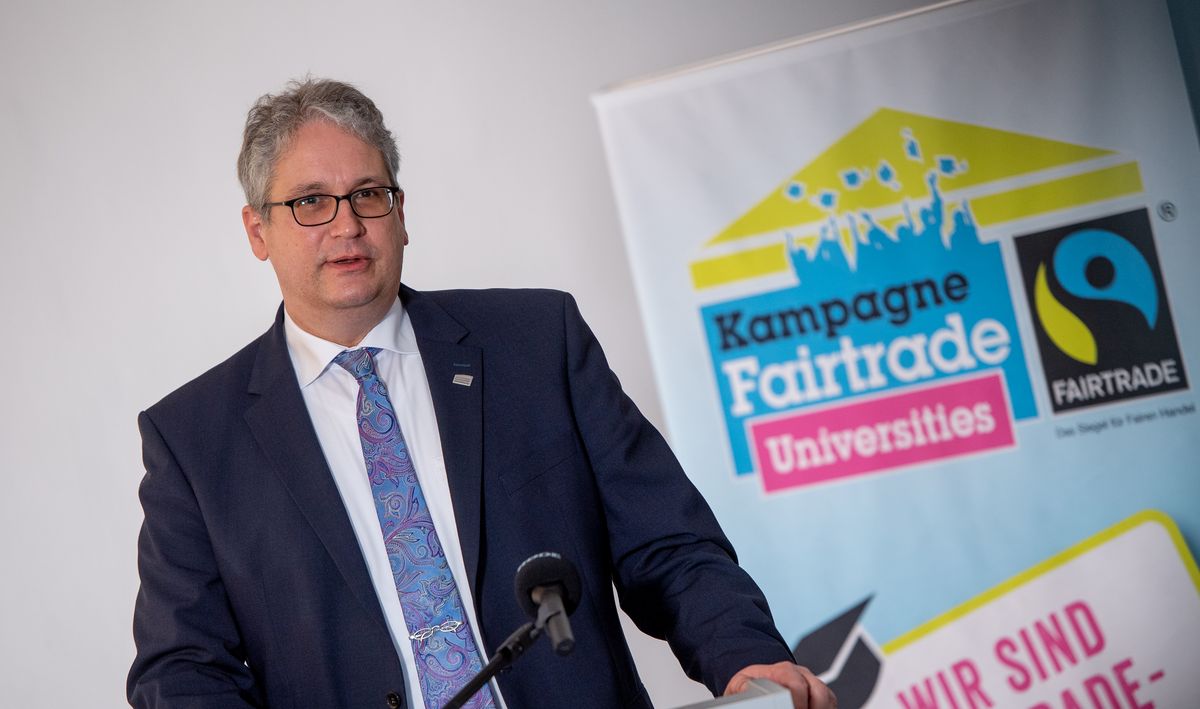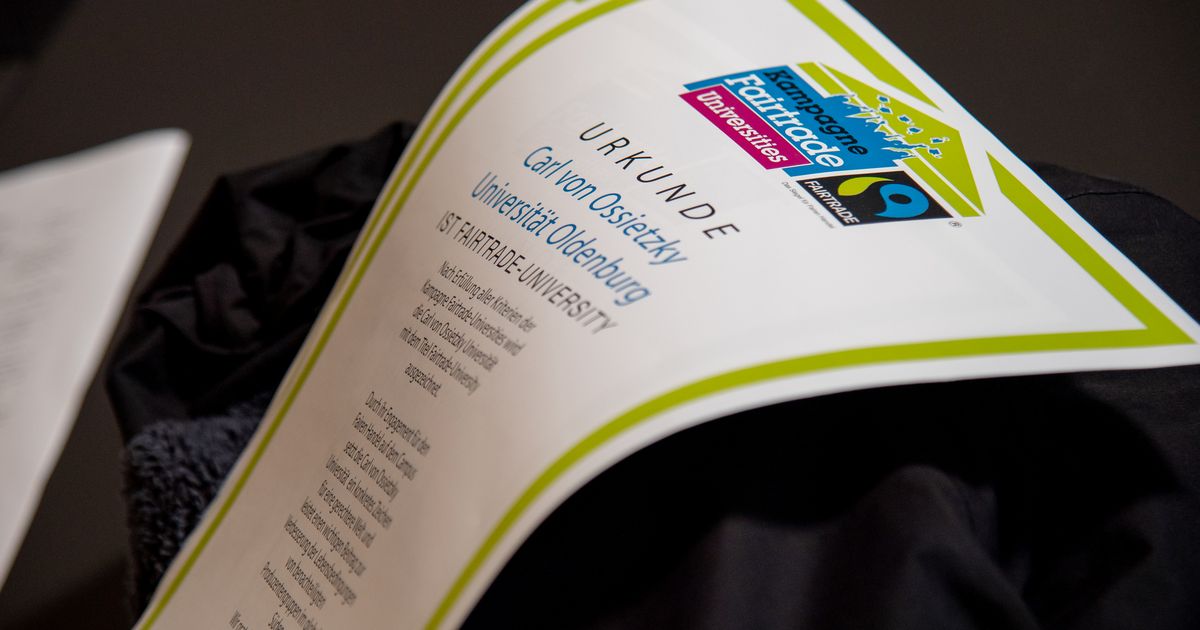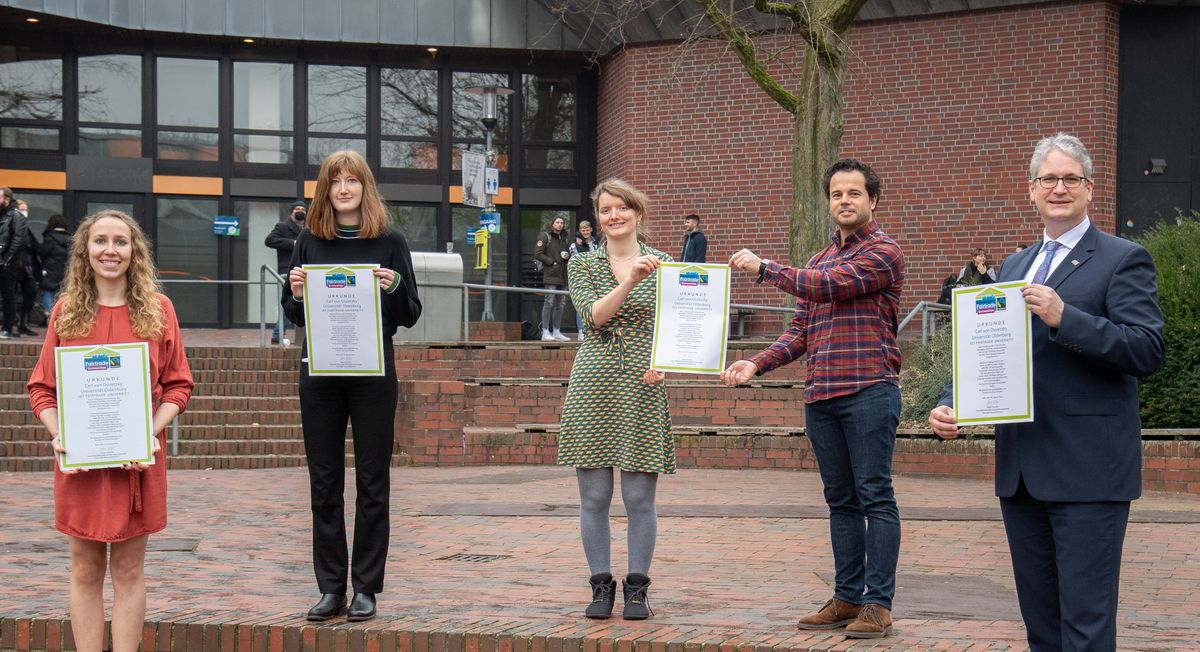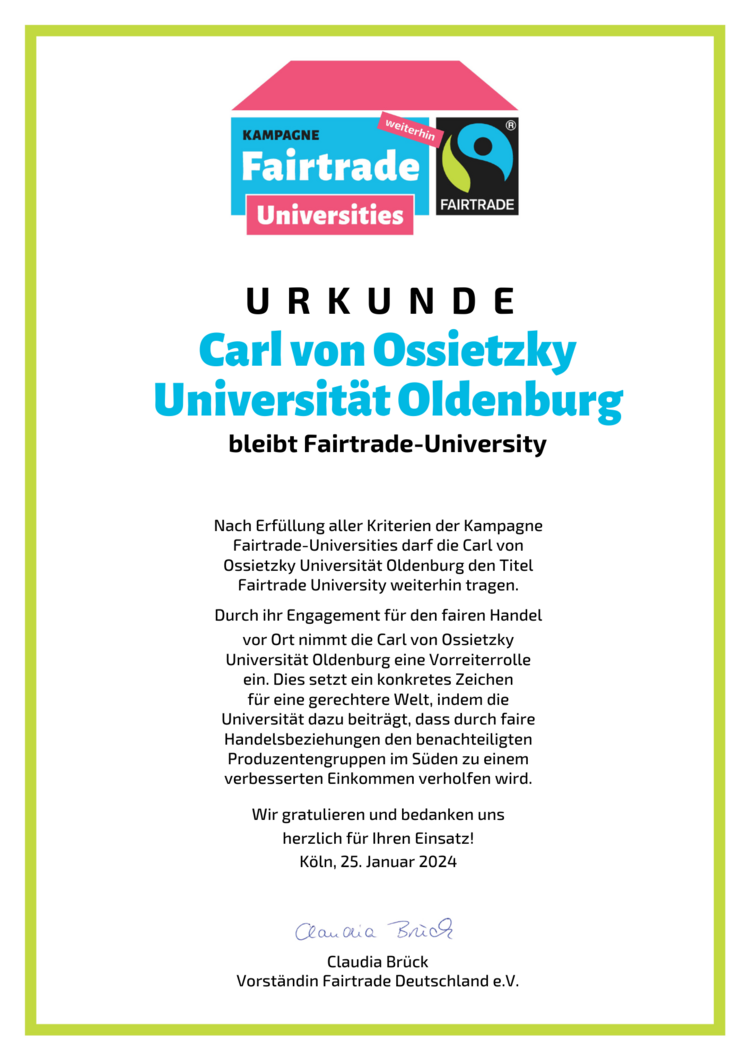FairTrade University
FairTrade University
A holistic view of sustainability encompasses many facets, including ensuring compliance with human rights in global supply chains and fair trading and manufacturing conditions.
The University of Oldenburg has been officially certified as a Fairtrade University since December 2021. In May 2024, the university was successfully recertified and can now hold the title for a further two years.
Comments on the award as a Fairtrade University
General Students' Committee of the University of Oldenburg
The AStA has campaigned for this award in order to encourage discussion of the important topic of fair trade at our university. However, the criteria are far from sufficient and the award is no reason to rest on one's laurels, but a constant process that must be continued. The student committee will continue to critically engage with the topic of Fairtrade and remind the university of its obligations as a Fairtrade University.
Johanna Belz, Sustainability Officer of the AStA
Fairtrade products with high standards ensure that the living situation of some people is improved in a very concrete way. But it must always be clear: The causes of exploitative working conditions in the countries of the global South are systemic and therefore cannot be eliminated by private consumption decisions. Combating these causes can only be done by recognising and changing these social conditions. Consequently, this means for us that the focus of dealing with the important issue of Fairtrade at the university should not only be on fulfilling the criteria mentioned. We hope that the university will contribute to a just society not only in its role as a cooperating Fairtrade partner, but much more as a place of critical education.
Helena Post, Sustainability Officer of the AStA
Jörg Stahlmann, Vice President for Administration and Finance
For the University of Oldenburg, the topic of Fairtrade is closely linked to its active commitment to climate protection, sustainability and diversity. As a university, we are called upon to assume our share of responsibility.
Jörg Stahlmann, Vice President for Administration and Finance
Jürgen Krogmann, Lord Mayor of the City of Oldenburg
This means that the city of Oldenburg, which was itself designated as a Fairtrade Town for the first time in 2019, has a strong partner in this important campaign. And the alliance continues to grow!
Jürg Korgmann, Lord Mayor of the City of Oldenburg
Dieter Overrath, Chairman of the Board Fairtrade Germany
We are pleased that more and more universities are taking their social responsibility seriously and are committed to fair trade and thus to sustainability. The 36 Fairtrade Universities across Germany show that issues such as fair procurement are not just a matter for cities, but that academic institutions can also make an important contribution.
Dieter Overrath, Chairman of the Board of Fairtrade Germany
Criteria
For this seal, the following requirements must be Criteria be fulfilled on a permanent basis:
- University resolution The central bodies (Senate, Rectorate, Student Parliament) of the university administration and the student body pass a joint resolution stating that the university wishes to apply for the Fairtrade University award.
- Steering group A steering group is formed at the university to coordinate fair trade activities on the way to becoming a Fairtrade University and beyond. The group consists of at least three people and brings together representatives of the student body, the university administration and the restaurants and shops on campus.
- Products at events At least two Fairtrade products are offered at official events of the university and at meetings of the central bodies of the student body and the administration.
- Products in shops and catering establishments Fair trade products are available on campus in shops, cafeterias and refectories. The number depends on the number of students. For our up to 20,000 students, this means at least ten points of sale, including at least one shop, one catering establishment and one kiosk/vending machine. At least two fair trade products are offered at each point.
- Media and public relations Fair trade events are held on campus at least twice a semester. In order to ensure that the topic is continuously present at the university, the events or campaigns are to be regularly distributed throughout the year and reported on.
Members of the steering group at the University of Oldenburg
- Student Union Oldenburg Head of Department of University Catering - Mr. Vinz
- Presidium of the University of Oldenburg Vice President for Administration and Finance - Mr. Stahlmann
- Department 3: Student and Academic Affairs Head of Department Ms Waitz
- General Students' Committee Sustainability Officer - Ms Post
- Oldenburg acts fairlysteering group Alternating representatives
Background knowledge: What is behind FairTrade?
History of the initiative The fair trade movement emerged in the 1950s when non-profit importers, non-governmental organisations (NGOs) and producer groups formed a partnership to fight poverty in economically less developed countries. With this aim, fair trade organisations formed in several countries, often in close association with development organisations and worldshops. In 1988, a Dutch NGO called Solidaridad created a new seal for coffee to guarantee that it came directly from democratically constituted smallholder organisations at a price that covered all their production costs. At the time, the seal was an absolute novelty that made it possible to work with conventional players in the trade and create volume. The seal was named after Max Havelaar, the hero of a successful 19th century novel about the exploitation of workers on a coffee plantation in Java during colonial times.
The idea was very well received: within a few years, similar organisations emerged in Europe and North America, for example the Fairtrade Foundation in Great Britain, TransFair e.V. (now Fairtrade Germany) in Germany and Rättvisemärkt in Finland, to achieve fairer trading conditions for producers. The organisations set up their own campaigns and independently awarded their own labels.
Fairtrade is born In 1997, some of these organisations established a global Fairtrade umbrella organisation: Fairtrade International, formerly called Fairtrade Labelling Organizations International. Its role was to set Fairtrade standards, support producers disadvantaged in the world market and develop the overall strategy for Fairtrade. In 2002, the single Fairtrade label was introduced, the current version of which can now be found on thousands of different products, including hot drinks, fruit juices, fresh fruits and vegetables, biscuits, pastries and confectionery, sugar, honey, jams and spreads, rice, wines, nuts and beyond food, on flowers, gold, footballs and cotton products.
Fairtrade International currently comprises 25 national Fairtrade organisations, three producer networks and seven marketing organisations. Producers and national Fairtrade organisations have equal voting rights in Fairtrade's General Assembly and Board.

